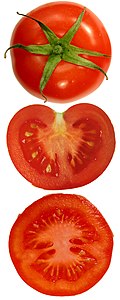
 A bilocular and a multilocular tomato fruit
A bilocular and a multilocular tomato fruit
A locule (pl.: locules) or loculus (Latin for 'little place'; pl.: loculi) is a small cavity or compartment within an organ or part of an organism (animal, plant, or fungus).
In angiosperms (flowering plants), the term locule usually refers to a chamber within an ovary (gynoecium or carpel) of the flower and fruits. Depending on the number of locules in the ovary, fruits can be classified as unilocular (uni-locular), bilocular, trilocular, or multilocular. The number of locules present in a gynoecium may be equal to or less than the number of carpels. The locules contain the ovules or seeds.
The term may also refer to chambers within anthers containing pollen.
In ascomycetous fungi, locules are chambers within the hymenium in which the perithecia develop.
References
- "loculus". Oxford Dictionaries. Archived from the original on July 18, 2012.
- Hickey, M.; King, C. (2001). The Cambridge Illustrated Glossary of Botanical Terms. Cambridge University Press.
- "Fungi Glossary". Palaeos.com. Archived from the original on 2015-11-18. Retrieved 2016-05-04.
| Botany | |||||||||||
|---|---|---|---|---|---|---|---|---|---|---|---|
| Subdisciplines | |||||||||||
| Plant groups | |||||||||||
| Plant anatomy |
| ||||||||||
| Plant physiology Materials | |||||||||||
| Plant growth and habit | |||||||||||
| Reproduction | |||||||||||
| Plant taxonomy | |||||||||||
| Practice | |||||||||||
| |||||||||||
This plant morphology article is a stub. You can help Misplaced Pages by expanding it. |